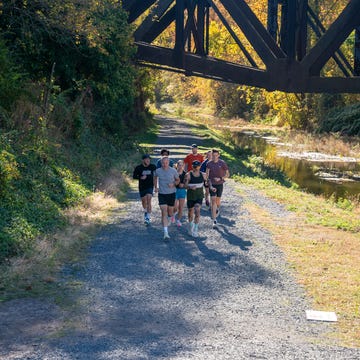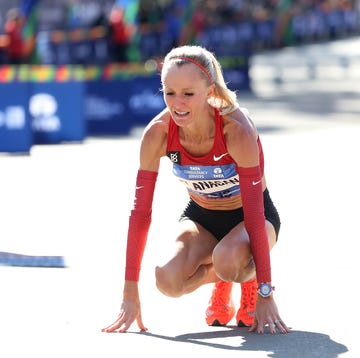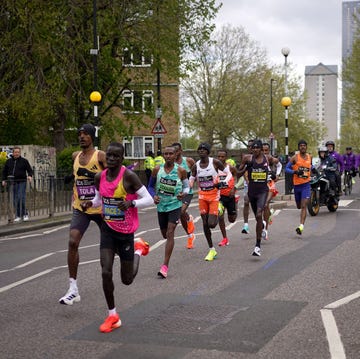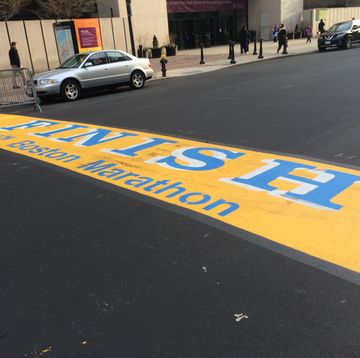It's astonishing, and gratifying, to see what's happened with running in the 35 years since Running Times was launched. Growing from somewhat obscure activity of a few thousand people in the 1970s pursuit for tens of millions today, running has had a revolutionary impact on 21st century American (and global) society. Or has it?
Unquestionably, long-distance running--especially road and trail running, at distances from 5K to ultramarathons--has profoundly changed our understanding of physical and mental health, the athletic capabilities of women, and even human nature itself. The changes have included a shift from mainly anaerobic measures of fitness to a strong emphasis on cardiovascular health; a growing emphasis on preventive medicine as opposed to just treating illness or injury after it happens; and a fast-growing interest in the essential connections among sustainable food production, nutrition and well-being.
As far as all that goes, it may seem that running has enjoyed a tremendous success. From the time of Alan Sillitoe's 1959 story, "The Loneliness of the Long-Distance Runner," to the scores of festival-like running events that take place every weekend today, the story of distance running has become a more epochal phenomenon than any of us who were on the scene in the '70s would have dared to imagine.
And yet, I have to wonder, just how much have the changes we've helped to foster actually improved the condition of society as a whole? A global consensus of environmental, biological and climate scientists has warned repeatedly--though largely to unhearing ears among politicians and media--that the world has entered a time of escalating ecological crisis. What we've learned as runners, not only about health and fitness but about our relationship with the planet we depend on for every breath, could have critical importance in reshaping the lifestyles and policies of our country.
In December 1960, president-elect John F. Kennedy wrote an article for Sports Illustrated, "The Soft American," in which he lamented what he believed to be the declining physical fitness of America's youth. JFK noted that almost one of every two young Americans being considered for military service had been rejected by the Selective Service as mentally, morally or physically unfit. He cited a study of muscular strength and flexibility tests that had been given to 4,264 American children and 2,870 of their European counterparts, in which 57.9 percent of the American kids failed one or more of the tests while only 8.7 percent of the Europeans failed.
Kennedy knew his country was facing unprecedented dangers (most particularly the Soviet nuclear threat), and he worried that Americans might not have the toughness and resilience we'd need to survive in a dangerous world. He emphasized that physical and mental strength are inextricably linked. The knowledge that "the physical well-being of the citizen is an important foundation for the vigor and vitality of all the activities of the nation, is as old as Western civilization itself," Kennedy wrote. "But it is a knowledge which today, in America, we are in danger of forgetting."
Now, more than half a century later, there's little evidence that Kennedy's hopes for a more physically, mentally and morally strong country have come to pass. The "obesity epidemic," as it was called in the Journal of the American Medical Association two years ago, is only the most conspicuous measure of the problem. Despite all that we've learned about cardiovascular fitness and nutrition, heart disease and diabetes remain mass killers. And once again, we're hearing questions in high places about whether America's youth is fit for military service. In May 2010, two former chairmen of the Joint Chiefs of Staff, generals John Shalikashvili and Hugh Shelton, wrote, "Obesity rates threaten the overall-health of America and the future strength of the military." Their comments eerily echoed Kennedy's.
Maybe most disturbing of all, physical passivity may be conducive to mental passivity. Fewer Americans read books now than did 35 years ago. And the average length-of a televised excerpt from a politician's speech has declined since then from 42 seconds to under 10 seconds, apparently because that's how much our collective ability to think about what the speaker is saying has declined. Instead of having the attributes of patience, perseverance and sharp senses that long-distance runners must have, the general population has fallen into patterns of chronic rushing, quick gratifications and quick exhaustion in almost all things.
Meanwhile, being demonstrably enduring in all our own pursuits, what have we runners done to help our troubled society find a more enduring and sustainable course? In some respects, it appears that we runners have simply gone our own way and now live in a parallel universe. We buy our high-tech shoes, Garmins and Gore-Tex gear and fly around the country (or take the Prius) to running events that are celebrations of the good life, but I wonder if we've become a little too disconnected from our origins--and our future.
Possibly the most momentous development in the recorded history of running, right up there with Pheidippides at the Plains of Marathon, or Joan Benoit at the 1984 Olympics in Los Angeles, is the emerging evidence of recent years that our species, Homo sapiens, evolved not as walkers (as so long believed) but as long-distance-running persistence-hunters. The first scientific article to draw attention to this new interpretation of our origins may have been David Carrier's landmark 1984 article, "The Energetic Paradox of Human Running and Hominid Evolution," in Current Anthropology.
That breakthrough was followed by two decades of study by the evolutionary scientists Dennis Bramble at the University of Utah and Daniel Lieberman at Harvard University, confirming that our species departed dramatically from the anatomy and look of the earlier species Australopithecus afarensis (they of the famous skeleton "Lucy"), which walked the Earth for a million years with little change and with a fairly small brain. The new research found that, with the advent of persistence running, the hominids who succeeded Lucy began to develop capabilities for endurance, patience and persistence that stimulated brain growth--and eventually, our distinctive capabilities to explore, adapt and invent.
The significance of that recent research will mean different things to different people. For many, it's rewriting the story of human evolution. For me^ its largest significance concerns the human future. Many thousands of years before the era of powerful technologies, and even before civilization began, human hunter-gatherers had to have developed highly acute powers of observation, patience and ability to envision what's ahead on the trail even if the eyes couldn't yet see it. These are the very qualities that enabled us to build civilization in the first place.
Ever since the 1950s, the decade that got JFK worrying, Americans have been on a technology binge, developing inventions that save time and energy by relieving us of work we formerly did with our hands and brains. It started with washing machines replacing hand washing and power mowers replacing push-mowers, and moved on to gasoline-powered leaf-blowers, which enable a man to stand relatively motionless with gasoline exhaust blowing in his face rather than having to move his arms back and forth with a rake. Since then, it's moved on to techno-assisting almost anything a person can do with body or brain, from flushing a toilet to adding a column of numbers. Turn the faucet in the rest room? Not necessary--just hold your hand under it. Read the writings of Thomas Jefferson or Charles Darwin? Not necessary--just turn on the TV. Run 5 miles a day to keep your heart healthy? No need--just take a prescription pill. Ask your doctor!
The danger here is that when a part of your body or brain isn't exercised, it weakens. A muscle that's not used will atrophy. That's true of our capacities to observe, persist and envision, as well. A study of London taxi drivers found that drivers who had relied on GPS for at least three years had a smaller hippocampus--the part of the brain where mental mapping, among other faculties, is located--than did drivers who had used their own ability to learn their way around the city. The danger is that lack of exercise, either physical or mental, can cause decline in the very qualities that let us build civilization--qualities that will be more essential than ever, if we're to make our civilization sustainable for much longer.
The good news, of course, is that cardiovascular exercise like running can regenerate those capabilities. In 2009, a major study published in the National Academy of Sciences Early Edition found that boys who increase their cardiovascular fitness from ages 15 to 18--by participating in cross country running or skiing, for example--score significantly higher on tests of intelligence than boys who don't. As reported on Futurity.org, Maria Aberg of the University of Gothenburg in Sweden and Nancy Pedersen of the University of Southern California reviewed fitness and intelligence scores for more than a million Swedish males who enlisted for mandatory military service at age 18, and "in every measure of cognitive functioning they analyzed--from verbal ability to logical performance to geometrical perception to mechanical skills--average scores increased according to aerobic fitness."
Any asset we have, whether it's our bodies, brains, or planet, can be corrupted and endangered if we become complacent about what keeps it vital. While I enjoy having some of the techno-assisted amenities we runners favor now (such as quick-drying apparel to replace the sweat-logged cotton T-shirts and shorts we wore in the '60s), I also feel a little uneasy about how readily we employ new technological assets to make running easier. Devices that measure our heart rates, distance covered, calories burned, pace, body fat and aerobic fitness at rest all replace our native capabilities to "listen to our bodies," as George Sheehan used to advise. Where do we draw the line between these techno-assists and performance-enhancing drugs? As more new enhancements appear, will there be a slippery slope to outright cheating?
Ultimately, the more important question is whether we're cheating on the task of creating a sustainable civilization. Distance running may be just a sport, but--as professors Bramble and Lieberman, among others, have confirmed--it's also one of the most fundamental and primal of all human activities. It's what originally helped us learn that we work best when we persist and envision what lies ahead, whether in space or in time, and that we're most successful when we work in groups, as the persistence-hunters must have. It's a big part of what made us human.
Running has come a long way as a sport, but humanity as a species has in many ways weakened. Over the centuries, religious and philosophical leaders alike have argued that with knowledge comes responsibility--think of the biblical apple. If that's true, we runners have a moral obligation to take more initiative to share what we've learned--about our interdependence with the natural world and each other, and about the critical importance of keeping our bodies and minds well-exercised.
When we launched Running Times 35 years ago, that kind of consideration affected our choice of the magazine's name. On one hand, we wanted to publish lots of race results (impossible and unnecessary today, but feasible then), so that as many readers as possible could have documentation of their 10K or marathon performances--their running times. But we also knew we had entered a time of broad cultural awakening. The 1970s were becoming a decade of revolutionary change in the fields of health and fitness, women's roles and rights and environmental consciousness. It wasn't just 'coincidence that these movements coincided. They were all related, and running tapped into all of them. We were beginning a great adventure, and the name seemed right for the times we lived in, not just for a journal of race results.
That first year, when we published three articles on the persistence-running Tarahumara Indians of Mexico's remote Barranca del Cobre--seven years before David Carrier's landmark article in Current Anthropology--we had only a faint inkling of what we'd tapped into. Although we titled that series, "If they don't ruj they don't eat," we were more interested in those stories as adventures than as early hints of what we'd later learn from the evolutionary scientists. Now, 35 years later, in looking back and relating our sport to the larger journey of humankind as a whole, it's astonishing to realize that those early millennia of our prehistoric, persistence-hunting species were, right from the beginning, running times.













